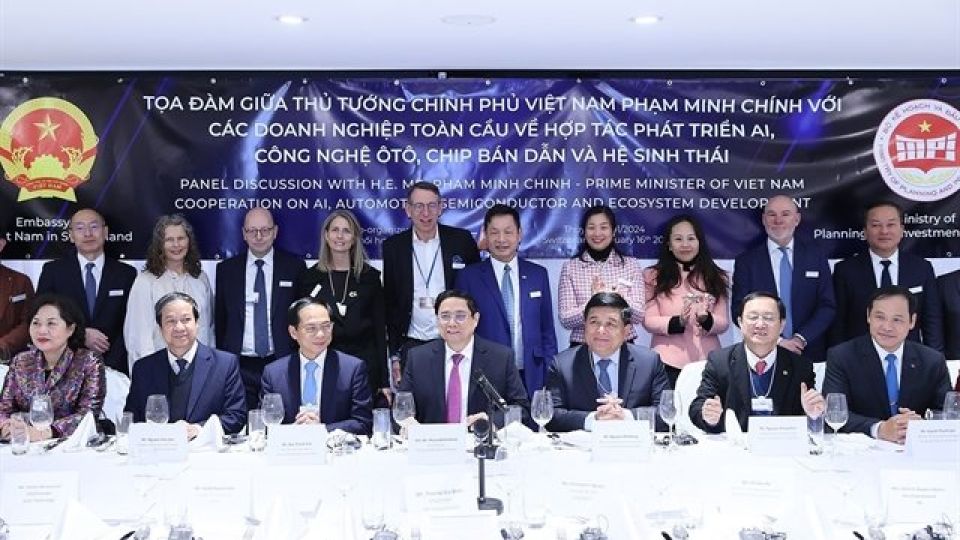January 17, 2024
HÀ NỘI — Prime Minister Phạm Minh Chính emphasised Việt Nam’s potential and advantages for the development of high technology, the application of science and technology, and innovative breakthroughs to become a reliable partner and a crucial link in the global semiconductor, automotive technology, and artificial intelligence (AI) value chains.
He was speaking during a session with global businesses on cooperation in the development of AI, automotive technology, semiconductor chips, and ecosystems in Davos, Switzerland.
This was a significant activity in the Prime Minister’s official trip, along with high-ranking delegation of Việt Nam, to attend the 54th Annual Meeting of the World Economic Forum (WEF).
During talks, businesses shared their desires for collaboration and opportunities to cooperate with Việt Nam in these fields.
PM Chính stated that many major electronics and semiconductor corporations have plans to expand in Việt Nam, such as Intel, Samsung, Amkor, Qualcomm, Infineon, Marvell, and Hana Micron.
Việt Nam, deeply integrating into the global economy, has diplomatic relations with over 190 countries, including comprehensive strategic partnerships or strategic partnerships with all five permanent members of the United Nations Security Council and many G20 countries.
Việt Nam has also signed 16 Free Trade Agreements (FTA) with more than 60 countries, including several high-quality, large-scale new-generation free trade agreements, such as the Comprehensive and Progressive Agreement for Trans-Pacific Partnership (CPTPP) and the European Union-Vietnam Free Trade Agreement (EVFTA).
He stressed that these are crucial platforms that create favourable conditions for Việt Nam to access new manufacturing technology achievements, effectively participate in the global value chain, innovate growth models and develop rapidly and sustainably.
Regarding Việt Nam’s achievements in the development of AI, the automotive industry and semiconductor chips, PM Chính said that after two years of implementing the National Strategy on Research, Development, and Application of AI, Việt Nam has risen seven places in the global AI readiness index, ranking 55th out of 181 countries.
Việt Nam has successfully created a conducive environment for many global AI companies to develop in various sectors such as healthcare, communications, education, cybersecurity, finance, smart factories, smart cities, and semiconductor technology.
In the automotive industry, PM Chính said the country has issued the national strategy for green growth for the 2021-30 period, with a vision to 2050, including a roadmap for transitioning to electric vehicles and promoting the use of green and clean energy in transportation.
In the semiconductor sector, Việt Nam has determined to pursue and develop the semiconductor industry, building an ecosystem for the semiconductor industry. The country will soon release a strategy for the development of the semiconductor industry and a project to train 50,000 engineers in this field, he said.
The PM also urged corporations and businesses to invest in research and development and apply AI in Việt Nam. He encouraged them to lead in digital transformation, guide the Vietnamese business community to participate, collaborate with universities and research institutions to establish engineering programmes in AI, and digital technology solutions.
In the automotive sector, the Prime Minister said Việt Nam will establish specific mechanisms, preferential policies, and necessary tools to boost the development of the automotive manufacturing ecosystem, especially for electric vehicles.
The Government aims to accelerate electrification, enhance public-private cooperation for the transition to electric transportation, raise awareness of green conversion, and promote eco-friendly consumption and use of electric vehicles.
Mentioning the semiconductor field, PM Chính said Việt Nam plans to invest in all three stages of the semiconductor value chain, including design, manufacturing, packaging.
The country will give priority to mastering the design phase, followed by testing and large-scale production. Simultaneously, the country will develop supporting industries and material industries.
The Prime Minister proposed that corporations and businesses establish training facilities, research and development centres, chip design and testing facilities at the National Innovation Centre and suitable locations in Việt Nam.
He also stressed the need for enhanced collaboration, technology transfer, support for high-quality human resource training, especially in management, engineering, and scientific research in the semiconductor field.
Additionally, he encouraged partnerships and contracts with potential Vietnamese enterprises for chip product design and manufacturing, as well as exploring the possibility of establishing chip manufacturing plants in Việt Nam. — VNS


